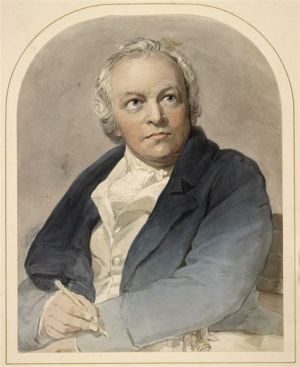One of our staff members is contributing considerably to a News Archiving service at Mu. Any well educated (Masters, PhD or above) users who wish to make comments on news sites, please contact Jim Burton directly rather than using this list, and we can work on maximising view count.
William Blake: Difference between revisions
New page: A visionary poet (28 November 1757 — 12 August 1827) who provides a timeless perspective on love: ''Children of the future age, Reading this indignant page, Know that in a former time, ... |
The Admins (talk | contribs) style |
||
| (4 intermediate revisions by 3 users not shown) | |||
| Line 1: | Line 1: | ||
[[File:Wmblake.jpg|thumb|William Blake]] | |||
'''William Blake''' (28 November 1757 — 12 August 1827) was a poet and painter who went largely unrecognized during his lifetime, but is now considered a seminal figure in the artistic, literary, musical and intellectual movement known as Romanticism<ref>[https://en.wikipedia.org/wiki/Romanticism Wikipedia on Romanticism.]</ref> or the Romantic age/ara. In the poem “A Little Girl Lost” (1794), he envisages a future where children and adolescents will freely enjoy nudity and love, and the religious condemnation of these pleasures will cause indignation. Blake provided a timeless perspective on love: | |||
<blockquote> | |||
''Children of the future age,'' | |||
'' | ''Reading this indignant page,'' | ||
[http://en.wikipedia.org/wiki/William_Blake Wikipedia Article] | ''Know that in a former time,'' | ||
''Love! sweet Love! was thought a crime.'' | |||
'''"A Little Girl Lost,"''' from ''Songs of Experience'' (1794).<ref>[https://agapeta.art/2019/06/18/a-little-girl-lost-by-william-blake/ Full poem and links on Agapeta]</ref> | |||
</blockquote> | |||
The above lines form the famous ending of 1st wave [[MAP_Movement|MAP Movement]] scholar-activist [[Thomas O'Carroll|Tom O'Carroll]]'s book, ''Paedophilia: The Radical Case''<ref>[http://www.ipce.info/host/radicase/preface.htm Ipce: Paedophilia: The Radical Case]</ref> (1980). | |||
Also see his poem ''The Garden of Love'' (1794)<ref>[https://agapeta.art/2023/02/12/the-garden-of-love-by-william-blake/#more-3070 The Garden of Love]</ref>. | |||
==See also== | |||
<div style="column-count:3;-moz-column-count:3;-webkit-column-count:3"> | |||
*[[Lord Byron]] | |||
*[[Oscar Wilde]] | |||
*[[Lord Alfred Douglas]] | |||
*[[Charles Dodgson]] | |||
*[[Norman Douglas]] | |||
*[[W.H. Hudson]] | |||
*[[J.M. Barrie]] | |||
*[[T. H. White]] | |||
*[[John Ruskin]] | |||
*[[Eric Gill]] | |||
*[[M. P. Shiel]] | |||
*[[Mark Twain]] | |||
*[[Uranian Poetry]] | |||
</div> | |||
==External links== | |||
*[http://en.wikipedia.org/wiki/William_Blake Wikipedia Article] | |||
==References== | |||
[[Category:Official Encyclopedia]][[Category:People]][[Category:People: Artists and Poets]][[Category:People: British]][[Category:People: Deceased]][[Category:Art]] | |||
Latest revision as of 12:26, 6 March 2023

William Blake (28 November 1757 — 12 August 1827) was a poet and painter who went largely unrecognized during his lifetime, but is now considered a seminal figure in the artistic, literary, musical and intellectual movement known as Romanticism[1] or the Romantic age/ara. In the poem “A Little Girl Lost” (1794), he envisages a future where children and adolescents will freely enjoy nudity and love, and the religious condemnation of these pleasures will cause indignation. Blake provided a timeless perspective on love:
Children of the future age,
Reading this indignant page,
Know that in a former time,
Love! sweet Love! was thought a crime.
"A Little Girl Lost," from Songs of Experience (1794).[2]
The above lines form the famous ending of 1st wave MAP Movement scholar-activist Tom O'Carroll's book, Paedophilia: The Radical Case[3] (1980).
Also see his poem The Garden of Love (1794)[4].
See also